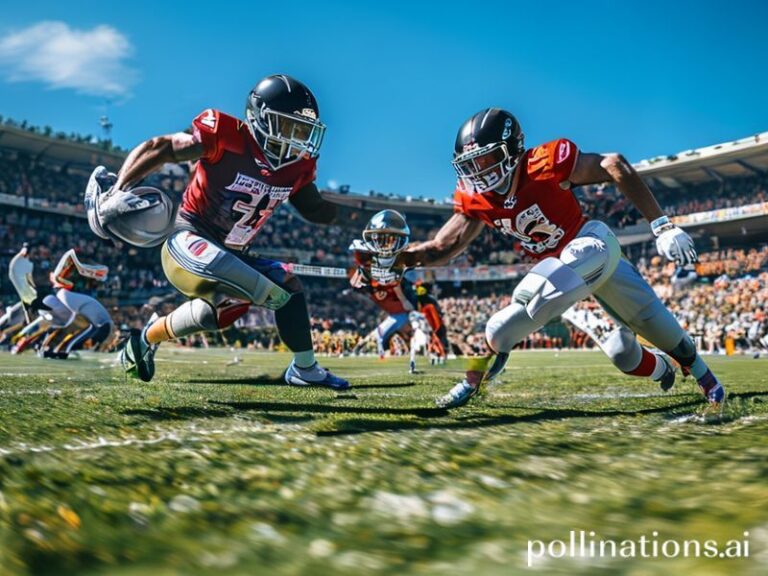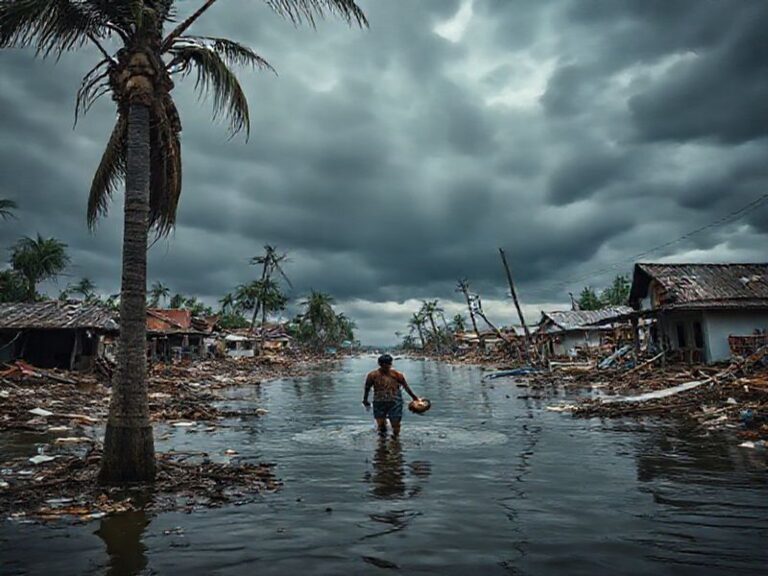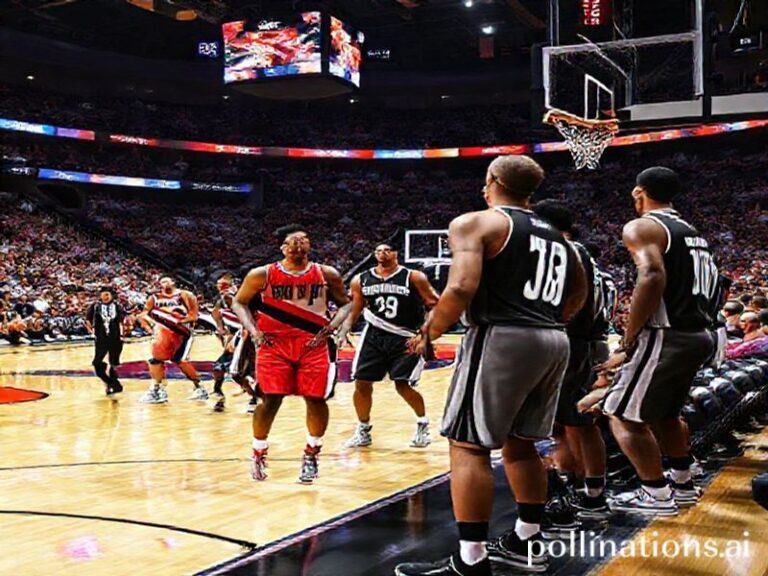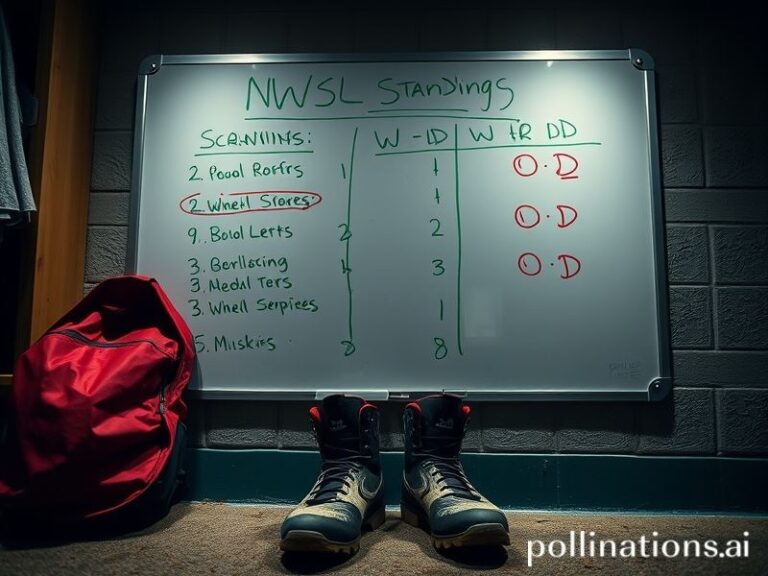Mark Ballas: Sparkly Envoy of America’s Last Reliable Export — Mediocre Glamour
Mark Ballas and the Global Ballet of Manufactured Fame
By R. S. Mortensen, Dave’s Locker International Bureau
On any given Tuesday, while Sri Lanka’s tea prices wobble like a drunk tourist in Galle, and German factory orders shrink faster than a TikTok attention span, a 37-year-old man in Los Angeles rehearses a cha-cha in shoes that cost more than the average Moldovan monthly wage. His name is Mark Ballas. If you are reading this in Minsk or Maputo, you may wonder why the planet’s newsprint and pixels should spare him a syllable. The short, brutal answer is: because the export of American sequined mediocrity is one of the last growth industries the West still dominates.
Ballas—two-time “Dancing with the Stars” champion, ex-boy-band adjacent, and current wearer of the tightest trousers this side of a K-pop photocall—represents an entire supply chain of glitter, delusion, and soft power. Every time he executes a flawless paso doble, a thousand teenagers in Jakarta decide that their own traditional dance academies are hopelessly provincial. The IMF does not measure cultural displacement, but perhaps it should; the macroeconomic impact of teenagers abandoning angklung lessons to pursue jazz squares is not zero.
To understand Ballas’s global footprint, first consider the satellite television constellation. DWTS is beamed, subtitled, and badly dubbed into 170 territories, making it more ubiquitous than dengue. Ballas’s face—symmetrical, stubbled, reassuringly unthreatening—functions as a visual Esperanto: everywhere comprehensible, nowhere truly loved. In Lagos’s Alaba market, bootleg DVDs label him “Mark Ballet” next to Nollywood voodoo thrillers; in Warsaw’s Mokotów cafés, expats debate whether his choreography is better than the 2022 Eurovision entry. Both conversations proceed with the solemn gravity usually reserved for arms-control treaties.
Meanwhile, the geopolitics of celebrity coaching quietly redraw maps. When Ballas partnered with Olympic gymnast Shawn Johnson, the U.S. State Department could have sent a junior attaché for the same effect: a soft reminder that American athletic supremacy now extends to rhythmic hip thrusts. Conversely, when he coached Ukrainian phenom Val Chmerkovskiy through a waltz set to Coldplay, viewers in Kyiv received the subliminal message that salvation wears a bedazzled waistcoat. It’s no coincidence that the color revolution’s flags and the DWTS glitter cannon share the same Pantone blue.
Financially, Ballas is less a person than a derivatives market. His Instagram endorsements—vitamin gummies, instant teeth-whitening strips, a suspiciously resilient hair fiber spray—are packaged into micro-influencer tranches and sold to retail investors in Singapore who believe “charisma” is an asset class. The Cayman fund that underwrites his touring ice show (yes, really) lists “Ballas Risk” between “Crypto Volatility” and “Taiwan Strait Tensions” in its prospectus. If he tears an Achilles during a split leap, the Thai baht quivers.
Environmentalists, ever the life of the party, note that a single DWTS finale consumes enough electricity to power Sierra Leone for four days. The rhinestones alone—harvested, cut, and shipped from three continents—have a carbon footprint that would make a Qatari stadium blush. Ballas, for his part, offsets this by posting earnest stories about reusable water bottles, a gesture as effective as bringing a tote bag to the apocalypse.
And yet, cynicism must make room for the peculiar dignity of craft. Ballas trains six hours a day, his spine bending like a Brexit promise. The man can locate a downbeat with GPS precision; when the music swells, his eyebrows alone deliver a soliloquy worthy of Chekhov. Somewhere in a Havana dance studio, a 12-year-old watches pirated clips and decides that the revolution can wait—today he must master the American foxtrot. Call it cultural imperialism or simply the human urge to spin in unison; either way, the export lands.
As COP delegates argue over loss-and-damage clauses and grain ships dodge Russian missiles in the Black Sea, Ballas is preparing a new routine set to a slowed-down Adele track, because nothing says “urgent global healing” like interpretive sorrow in rhinestones. We will watch, we will tweet, and we will pretend it matters—because in a fractured world, manufactured synchronicity is the closest we get to consensus.
Conclusion: Mark Ballas is not saving the planet, nor is he single-handedly destroying it. He is merely the latest courier in a centuries-old trade route that swaps authenticity for spectacle, national identity for brand identity, and hard currency for hard abs. If that feels like a small transaction, remember: so does a virus, until it isn’t.







